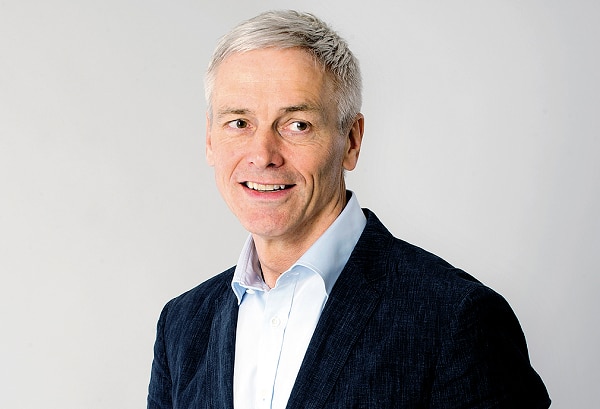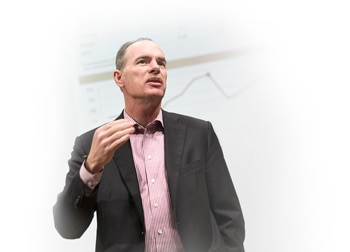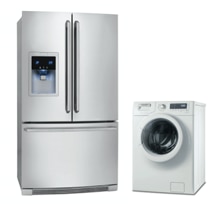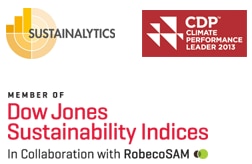Integrating sustainability
In 2013, the focus continued on internal alignment to the sustainability strategy. Through these frequently asked questions, Henrik Sundström, VP Sustainability Affairs explains how Electrolux is striving to integrate sustainability more deeply into the business.

On integrating sustainability into operations
| Responsibility for implementing sustainability work is split between Group functions and business areas. Electrolux continues to embed sustainability priorities into Group processes such as product development and operational efficiency. It is the responsibility of every business area to manage people, the environment and stakeholder partnerships, including dialog on public policy issues in line with Group standards. In this way, learning is shared across markets while Electrolux continues to meet local requirements. |
|---|
On integrating sustainability into products
| With the majority of our carbon impact occurring during product use, a strategic priority is to innovate for efficiency. Sustainability is integrated for individual products at the concept and design phases using the Product Management Flow, while the Group 2020 carbon target provides an overarching emissions reduction goal. |
|---|
On the role of Sustainability Affairs
| Sustainability Affairs, a Group function, has responsibility for defining and promoting sustainability as an integral part of the business strategy. This includes setting targets, raising awareness, dialog and monitoring progress. It is also responsible for engaging stakeholders on sustainability issues and dialog to raise awareness of the role of energy- and water-efficient appliances. |
|---|
On policies that reinforce or sustainability commitment
| As an overarching policy statement, the Code of Ethics covers rules of conduct for relations with employees, business partners, shareholders and other stakeholders. The Code of Conduct, Environmental Policy and Policy on Corruption and Bribery are all included as elements of the Code of Ethics. All of the Group’s codes and policies are based on universal standards of doing business, including those of the International Labor Organization. They reflect the Group’s ongoing support of the ten principles of the UN Global Compact. The Code of Conduct defines high employment standards for employees in all countries and business areas as well as for all suppliers. It covers, among others, under-age and forced labor, health and safety, workers’ rights and environmental compliance. A process to update the Code was initiated in 2013 in part to reflect the UN Guiding Principles on Business and Human Rights, and the revised OECD Guidelines for Multinational Enterprises. The Environmental Policy outlines the Group’s commitment to improve environmental performance in production, product use and disposal. The policy prescribes the precautionary principle. The Workplace Standard describes requirements for how operations and suppliers must meet Code of Conduct and environmental criteria. It also gives best practice examples. |
|---|
On creating a culture of engagement
| One Electrolux comprises core values and a foundation of operational values based on these elements: sustainability & safety, diversity & ethics, and respect & integrity. Together, they guide how people must treat each other and approach day-to-day business interactions with customers, suppliers and others. Human resource teams reinforce this culture through employee feedback, training and performance appraisals. Local Human Resource teams are crucial for rolling out the Ethics at Electrolux program, with the support of Group Legal and Sustainability Affairs, Human Resources and the Internal Audit function. Electrolux has internal award schemes, such as the Sustainability Award, as well as safety days and specialized activities focusing on the environment and sustainable innovation. These highlight the importance of commitment and engagement from every individual. To embed this mindset further in the organization, Electrolux introduced the Purpose program. It aims to engage employees in sustainability objectives and build an understanding of the value Electrolux creates beyond financial and market objectives. |
|---|
On encouraging high standards upstream, among suppliers
| Group Purchasing is ultimately responsible for compliance with the Code of Conduct and Workplace Standard along the supply chain. As an integrated part of the purchasing process, purchasing teams ensure that high social and environmental standards remain mandatory and non-negotiable parts of evaluating potential and existing suppliers. Purchasing teams are trained in Code of Conduct compliance. The Responsible Sourcing Program is a supplier compliance and development function closely linked to Purchasing functions in all regions. It supports local purchasers and suppliers with training, audits and additional activities in Latin America, Europe Middle East and Africa as well as Asia/Pacific. The director of the program reports to Sustainability Affairs. |
|---|
On the importance of training and monitoring
| A robust approach to managing sustainability issues requires training and follow-ups. There are training and awareness activities for employees that cover Ethics at Electrolux, ISO14001 certification, anti-corruption, the Code of Conduct and Workplace Standard (also for suppliers), safety, and leadership. Training is supplemented by internal and third party monitoring. During 2013, Electrolux introduced a global provider for ISO certification audits covering all manufacturing facilities. This provider monitored performance against specific environmental, health and safety provisions as set out in the Workplace Standard. |
|---|
On managing risks
|
Risks related to business operations are monitored by the internal auditing function and usually managed by each unit. Financial risks are managed at Group level and sustainability risks are monitored through materiality and stakeholder dialog. The Code of Ethics, Code of Conduct and Environmental Policy also help reduce non-financial risk. By year-end 2013, 48 countries and almost 90% (75%) of all Electrolux employees had access to the whistle-blowing system, enabling them to confidentially report potential incidents of non-compliance. Employees have been trained in the organization’s ethics policies and procedures, including anti-corruption. Rollout is expected to be completed during 2014. Electrolux maps its operations and suppliers against areas identified by external sources such as Maplecroft. Risk areas include child labor, forced labor, discrimination, freedom of association, working conditions and corruption. Countries with high risk include Argentina, Brazil, China, Egypt, Mexico, Romania, Thailand and the Ukraine. Suppliers are located in other high-risk countries as well. A similar process for mapping environmental risks is conducted annually. During 2013 Electrolux worked with WWF to map water-related risks associated with Group factories. |
|---|
On identifying key sustainability issues
| Electrolux identifies the most important sustainability topics for the company and its stakeholders via an annual materiality process. The outcomes of the materiality process provide information for the review and adjustment of risk management and feed into priority setting, operational plans and reporting for the coming year. |
|---|
CEO Statement

In 2013 we continued to deliver above our growth target and delivered 4.5% in organic sales growth.
CEO Statement

I'm convinced that raising product efficiency for the growing middle class is where long-term shareholder value creation lies.
Our products

Electrolux is the only appliance manufacturer in the industry to offer complete solutions for both consumers and professionals. The focus is on innovative and energy-efficient products in the premium segments.
Sustainability
Achieving the Group's vision of sustainability leadership is crucial to realizing the business strategy. The objective is to develop smarter, more accessible, resource-efficient solutions that meet people's needs and improve their lives. Read the comprehensive sustainability performance review.
Awards & recognition

Financial Reporting
Net sales for the Electrolux Group in 2013 amounted to SEK 109,151m, as against SEK 109,994m in the previous year. The organic sales growth was 4.5%, while currencies had an impact of -5.3%.
